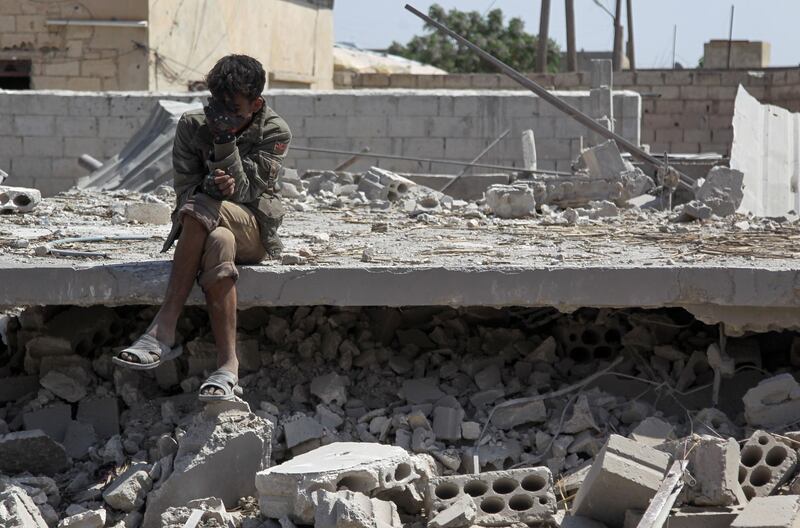War is coming to Idlib once again. The north-western province of Syria, the last under rebel control, has come under attack by forces loyal to Bashar Al Assad and his Russian allies. Bombs, made of barrels filled with explosives, have been indiscriminately dropped from helicopters, raising the death toll to roughly 100 civilians in one week.
We already know the broad contours of the humanitarian catastrophe that will ensue when the Assad regime’s ground campaign begins in earnest. More than three million people are trapped in Idlib, between the government’s advance and the radical militants who control the province. Tens of thousands have already been displaced by the fighting and will flee towards the Turkish border. Thousands will likely perish before the battle is over.
We've seen the brutality with which the regime has prosecuted its set-piece campaigns in recent years in Aleppo and Eastern Ghouta, places that have become bywords for atrocities. This is further made clear by the return of one of the most ruthless of the regime's tactics – the deliberate bombing of hospitals.
Over the past week of escalation, 12 medical facilities have been targeted by the Assad regime and its Russian allies, according to the Union of Medical Care and Relief Organisations, which operates many hospitals in opposition-controlled parts of Syria. Those stricken hospitals include an underground facility targeted by bunker-buster bombs, and smaller field clinics.
Even more outrageously, five of the those hospitals had shared their GPS co-ordinates with the UN, a measure meant to protect them from being targeted in times of war. In this case, however, doing so appears to have led directly to their bombing by regime forces.
Three years ago, the bombing of hospitals was still capable of provoking outrage. In an interview in 2015, Joanne Liu, the president of Doctors Without Borders, told me that wars across the region were being increasingly fought as they were in “barbarian times”, with little regard for international norms.
In the following years, things have worsened considerably.
UN investigators have long concluded that the Assad regime's attacks on hospitals are a systematic war strategy, whose roots lie in a decree issued early in the conflict, which designated medical facilities in areas outside government control as illegitimate, making them de facto military targets.
According to the Syrian American Medical Society, which supports hospitals inside Syria, there were at least 428 attacks on healthcare facilities between 2015 and 2017. The 120 of those assaults that took place in 2017 led to the temporary and permanent closure of 41 facilities and the deaths of least 21 medical personnel. The fighting in Idlib over the past two weeks has left thousands more without access to healthcare.
The figures over the course of the war are even more alarming. The NGO Physicians for Human Rights (PHR) has corroborated 553 attacks on 348 separate medical facilities from the start of the uprising until the end of last year, as well as the killing of nearly 900 doctors, nurses, emergency responders and other medical personnel. The Syrian government and its Russian allies carried out around 90 per cent of the attacks.
Those figures are likely to be an underestimate. Spikes in violence have frequently occurred during major campaigns to seize key territory such as Eastern Ghouta. This trend is now being replicated in Idlib.
Out of the 890 medical personnel who were killed in Idlib, 802 died at the hands of the Syrian government, Russia and allied forces, according to PHR. Some were tortured before being killed.
I visited the town of Khan Sheikhun in Idlib in April 2017, shortly after a chemical attack by the regime killed 90 people. Repeated bombing of the local hospital followed the initial gas attack. Some of the dead had been placed under an awning across from the entrance, which collapsed on their bodies when the bombing began.
I walked the darkened hallways of the hospital afterwards, and it was like being in an episode of The Twilight Zone. Everything was unnatural. Dust, broken glass and rubble replaced the once sterile, sparkling white hospital. Operating chairs were uprooted by a brute force that stood in stark contrast to the care they should have been used to provide.
Seeing this in person, it struck me just how nauseating it was for such a place be bombed. There is an evil to chemical attacks; something truly insidious about turning the very air that people breathe into a weapon. Attacks on hospitals embody a similar betrayal of humanity.
The resumption of hospital bombardment heralds the war to come – a deadly free-for-all, in which Idlib's three million people will pay the price. Behind that dismal prediction lies another chilling truth. The horrific violence of the Syrian civil war has effectively torn down the fundamental tenets of the rules-based world order. Barbarian times, indeed.





